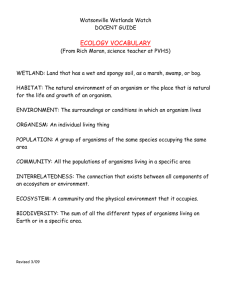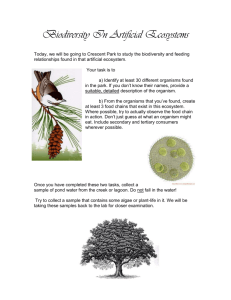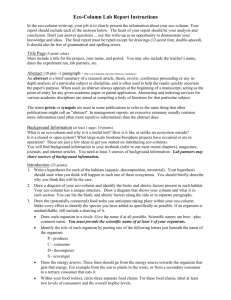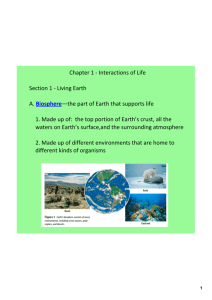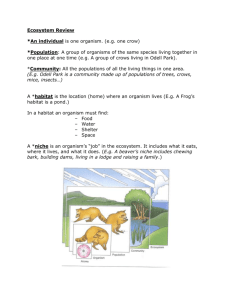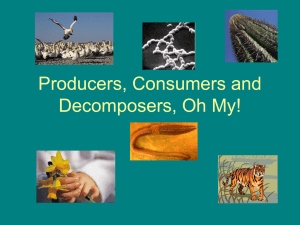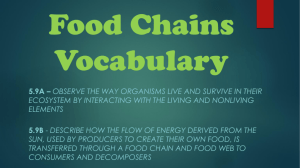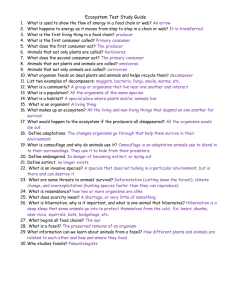Energy Flow ppt
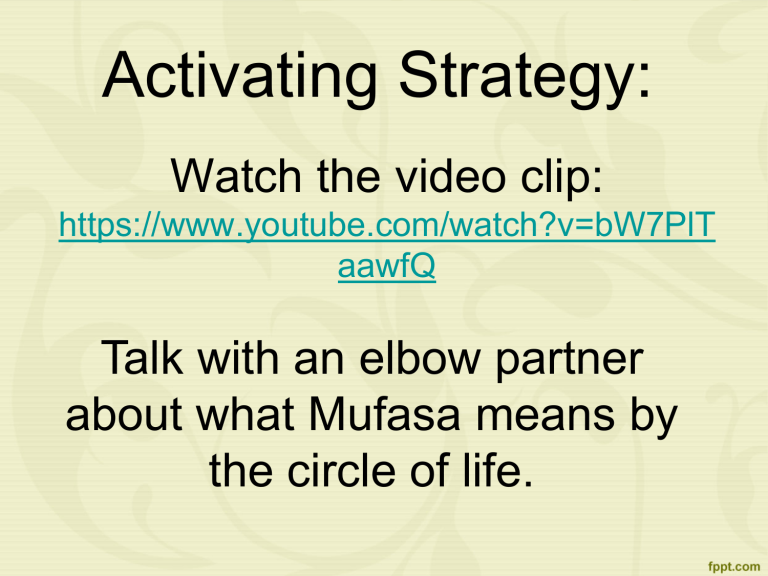
Activating Strategy:
Watch the video clip: https://www.youtube.com/watch?v=bW7PlT aawfQ
Talk with an elbow partner about what Mufasa means by the circle of life.
Essential Question:
How does energy flow through an ecosystem?
Standards:
S7L4a. Demonstrate in a food web that matter is transferred from one organism to another and can recycle between organisms and their environment.
S7L4b. Explain in a food web that sunlight is the source of energy and that this energy moves from organism to organism.
What is matter?
Matter is anything that has mass and takes up space.
What happens to matter in the
“circle of life”? Does it just disappear?
Matter in an ecosystem may change form, but it never leaves the ecosystem.
The movement of matter through the living and non-living parts of an ecosystem is a continuous cycle.
What does the diagram to the right illustrate about our environment?
You learned about various cycles in the atmosphere, hydrosphere, and lithosphere in sixth grade. Now, we are going to examine cycles in the biosphere.
What are some cycles you have learned about before in science?
Three of the most important cycles in ecosystems involve water, carbon, and nitrogen.
Water Cycle
http://pmm.nasa.gov/education/videos/tour-water-cycle
Carbon Cycle
What processes are involved in the Carbon Cycle?
[Hint: You learned them in the Cell Processes unit] http://studyjams.scholastic.com/studyjams/jams/science/ ecosystems/carbon-cycle.htm
https://www.youtube.com/watch?v=4vJ_1ojjlxw
Nitrogen Cycle
http://studyjams.scholastic.com/studyjams/jams/science/ecosystems/nitrogencycle.htm
https://www.classzone.com/books/ml_science_share/vis_sim/em05_pg20_nitrog en/em05_pg20_nitrogen.swf
Why are the water, carbon, and nitrogen cycles important?
All three cycle elements necessary for life through the atmosphere, soil, and living organisms.
Energy also cycles continuously through the environment.
Energy is the ability to do work or to cause a change.
Energy Strip
Activity
Energy is essential to all living things. Where does this energy come from?
Energy comes directly or indirectly from the Sun.
Organisms obtain the energy they need in different ways.
Producer
• An organism that captures energy from sunlight and changes it into chemical energy
• Producers are autotrophs because they make their own food
• Producers are a source of food for other organisms
Producer: Examples
Photosynthetic Bacteria
Plants
Algae
Consumer
• An organism that gets its energy by eating, or consuming, other organisms
• Consumers are heterotrophs because they feed on other organisms to get their energy
• There are different types based on what it consumes
Consumer: Herbivore
A consumer that feeds on plants or algae
Squirrel
Zebra
Elephant
Consumer: Omnivore
A consumer that feeds on both plants and animals
Skunk
Hedgehog
Bear
Consumer: Carnivore
A consumer that feeds on other animals
Alligator
Hawk
Cheetah
Consumer: Scavenger
A consumer that feeds on dead animals
Earthworm Raccoon
Vulture
Decomposer
• An organism that breaks down dead plant and animal matter into simpler compounds
• Decomposers return matter to soil or water where it may be used again and again
Decomposer: Examples
Bacteria Fungi
Mr. Parr Decomposers Song [3:20] https://www.youtube.com/watch?v=WLk-9ib0OVA
Watch the video clip and write down your observations using the following guidelines:
1. What’s occurring in the video?
2. Is the process shown harmful or beneficial? Why?
3. What would happen if the process shown did not occur?
4. The process shown can be described as a cycle, why?
https://www.youtube.com/watch?v=C6sFP_7Vezg
Study Jams:
Ecosystem
Energy Roles Song
[3:47 introduces additional concepts]
Organism Card Activity
Food Chains
Food chains are used to describe the feeding relationship between a producer and a single chain of consumers in an ecosystem.
Food Chains
Why does the grasshopper eat the plant? What about the owl and the snake?
Organisms eat or make their own food so the food can be converted into energy.
Food Chain
Energy is going from the corn to the locust
Energy is going from the locust to the lizard
Energy is going from the lizard to the snake
The arrows show the direction in which
Notice the direction of the arrows.
the energy from the food is moving
Where does the energy for the food chain always begin?
Based on the two food chains, what do you think terrestrial means?
Terrestrial means land and marine means sea
circled in the food chain and why is it shown differently?
in the soil.
Study Jams:
Food Chain
https://www.youtube.com/watch
?v=iWfEn8J5xKM
[Food Chain Song 3:33]
Constructing a
Food Chain
Activity
Food Web
A food web is a model of feeding relationships between many different consumers and producers (several food chains together).
Food Web
Food Web
Food Web Game
Constructing a
Food Web
Activity
Study Jams:
Food Web
Food Chains/Web
Both food chains and food webs show how different organisms receive their energy. They also show how different organisms depend on one another.
If one organism is removed from the food web or food chain, it may affect many other organisms in the ecosystem.
Use the Food Web Interdependence handout provided by the teacher and with an elbow partner discuss and describe what might happen if the fish population was suddenly removed from this ecosystem?
Within an ecological food chain/web, consumers are categorized into three groups.
A Tertiary consumer feeds only on secondary consumers
Secondary consumers, on the other hand, are mainly carnivores, and prey on other animals
Primary consumers are usually herbivores, feeding on plants and fungus
Within an ecological food chain, consumers are categorized into three groups.
Each level is referred to as a
Trophic Level
As energy moves from organism to organism, the amount of energy available for transfer decreases.
What does this mean for the polar bear?
The polar bear has to eat more than the seal, cod, shrimp, etc. to get the amount of energy it needs.
Amount of Energy
Another way to picture the flow of energy in an ecosystem is to use an energy pyramid.
Identify the different levels of the energy pyramid on your notes and answer the additional questions.
Why is bacteria shown at both the top and the bottom of the pyramid to the right?
Pyramid Model
Activity
Food Web
Formative
Assessment
Practice
How is the flow of energy in ecosystems like our money? Turn to a seat partner and discuss.
With a different seat partner, discuss our lesson activating question, what did
Mufasa mean by the
“circle of life”?
